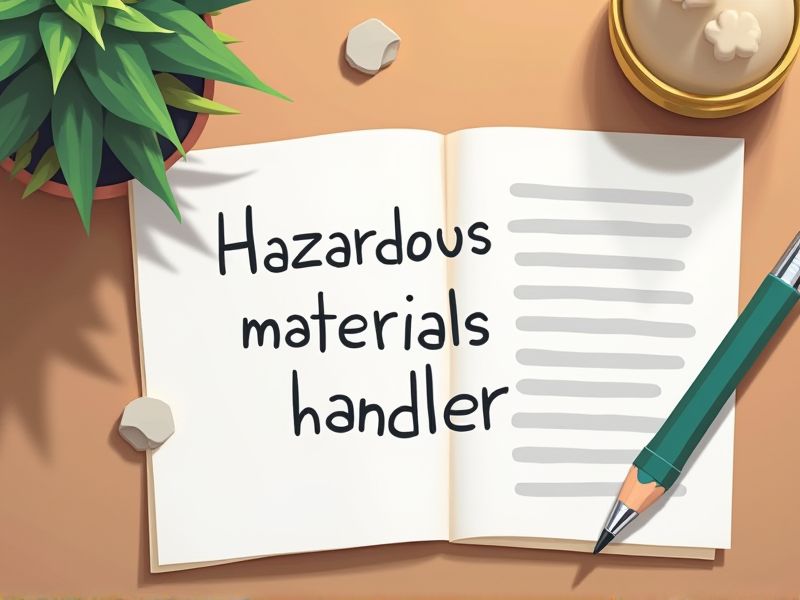
Handling hazardous materials involves exposure to substances that can jeopardize health and safety. Certifications ensure that handlers possess the necessary skills and knowledge to manage such materials safely and effectively. Regulating certifications minimizes risks associated with mishandling, subsequently protecting the environment and human life. Consider these key certifications essential for a hazardous materials handler.
OSHA HAZWOPER 40-Hour Certification
OSHA HAZWOPER 40-Hour Certification ensures that hazardous materials handlers receive comprehensive safety training. This certification decreases the likelihood of accidents and health risks by providing knowledge on handling hazardous substances. Regulatory compliance is achieved, as OSHA mandates training to meet safety standards. Employers benefit from reduced liability, as certified workers are better equipped to manage hazardous materials safely.
OSHA HAZWOPER 8-Hour Refresher Certification
The OSHA HAZWOPER 8-Hour Refresher Certification is essential because it ensures that hazardous materials handlers stay current with safety protocols and regulations, minimizing the risk of accidents and injuries. Regular updates on safety standards help maintain compliance with federal guidelines, potentially avoiding costly penalties or legal issues for the employer. Ongoing training reinforces critical knowledge and skills, improving workplace safety and efficiency in hazardous environments. Consistent refreshers keep employees informed about new developments in hazard management, supporting a culture of safety and preparedness.
DOT Hazardous Materials (HazMat) Endorsement
A DOT Hazardous Materials (HazMat) Endorsement is necessary because it ensures that drivers transporting hazardous materials meet federal safety and security requirements. This endorsement mandates comprehensive training, reducing accidents and promoting safe handling of potentially dangerous substances. Compliance with this regulation helps protect the public and environment from hazardous incidents. Companies avoid significant fines and penalties by ensuring their handlers are certified, maintaining legal and operational integrity.
NFPA 472 Hazardous Materials Response Certification
The NFPA 472 Hazardous Materials Response Certification is crucial for hazardous materials handlers to ensure they have the necessary skills to effectively manage potential incidents. This certification provides standardized training, which reduces the risk of accidents and enhances safety for both workers and the public. Compliance with NFPA 472 helps organizations meet legal and regulatory requirements, thus minimizing liabilities. Proper certification fosters confidence and readiness in emergency situations, leading to more efficient and timely response efforts.
NFPA 473 Hazardous Materials Technician Certification
The NFPA 473 Hazardous Materials Technician Certification ensures that hazardous materials handlers possess the necessary skills and knowledge to safely manage and mitigate incidents involving dangerous substances. This certification provides standardized training, reducing the risk of accidents and improving response times in emergencies. Employers can comply with regulatory requirements and enhance workplace safety by having personnel certified under NFPA 473. Credentialed technicians instill greater confidence among communities and stakeholders when dealing with potential hazardous material hazards.
Transportation of Dangerous Goods (TDG) Certification
Transportation of Dangerous Goods (TDG) Certification is needed to ensure that handlers of hazardous materials understand how to manage and transport these materials safely, significantly reducing the risk of accidents. The certification mandates compliance with national and international regulations, providing a standardized approach to handling potentially dangerous goods. Proper training and certification prevent costly legal repercussions and minimize environmental and human health risks. Certification also enhances the credibility and reliability of businesses involved in the transportation and handling of hazardous materials, fostering trust among clients and partners.
EPA RCRA Training Certification
The EPA RCRA Training Certification is crucial because it ensures handlers understand federal regulations governing hazardous waste management. Proper training minimizes risks of environmental contamination and enhances safety practices in handling, storing, and disposing of hazardous materials. Certification reduces the likelihood of accidents and legal liabilities by equipping handlers with knowledge of compliance standards. Improved operator proficiency directly results in reduced hazardous incidents and operational efficiencies.
Confined Space Entry Certification
The confined space entry certification ensures that hazardous materials handlers are trained to recognize and mitigate risks associated with limited access environments. Without this certification, workers would have a higher likelihood of exposure to toxic substances, leading to health risks and potential accidents. Employers are required to comply with safety regulations to avoid legal consequences and ensure a safer workplace. Certified personnel can implement emergency rescue procedures effectively, reducing the potential for injury or fatality during incidents.
CPR/First Aid Certification
Having CPR/First Aid certification equips hazardous materials handlers with critical skills to respond effectively to medical emergencies, reducing potential health complications. Exposure to dangerous substances increases the likelihood of accidents, necessitating immediate medical attention that certified personnel can provide. Certified handlers act promptly during emergencies, potentially minimizing the severity of injury or illness. Regulations often require such certifications to ensure workplace safety standards are met and to instill confidence in emergency preparedness.
Incident Command System (ICS) Certification
Hazardous materials handlers require Incident Command System (ICS) Certification to standardize emergency response protocols, ensuring efficient coordination during incidents. The certification equips handlers with skills to integrate into larger response teams, enhancing safety across operations. ICS training addresses communication barriers, reducing misinterpretation risks during critical situations. Certification promotes compliance with federal regulations, potentially minimizing legal liabilities for organizations.
Summary
When you obtain certifications as a Hazardous materials handler, your credibility and expertise in managing dangerous substances increase, ensuring safer work environments. Companies often prefer certified handlers, potentially leading to enhanced job opportunities and career advancement. Certified handlers tend to have better knowledge of compliance with regulations, reducing legal risks for employers. Your demonstration of a commitment to safety may also result in greater trust from colleagues and stakeholders.
